ROBERTO DEVEREUX
A musical ladies’ party
Roberto Devereux. Opera by Geatano Donizetti. Gaetano Donizetti. Tragedia lirica in three acts. 1837. Libretto by Salvadore Cammarano, after the play Elisabeth d’Angleterre by François Ancelot. First staged at the Teatro S Carlo, Naples, on Oct. 28, 1837.
The National Opera, April 18, 2024
Further performances: 21 (m), 24, 26, 29 April, 2, 6 May 2024
Conductor: Enrique Mazzola
Director: Jetske Mijnssen
Elisabetta, Queen of England Barno Ismatullaeva
Duke of Nottingham Nikolay Zemlianskikh
Sara, Duchess of Nottingham Angela Brower
Roberto Devereux Ismael Jordi
Lord Cecil Thando Mjandana
Sir Gualtiero Raleigh Mark Kurmanbayev
A page Peter Arink
A relative of Nottingham Sander Heutinck
Music: 4****
Staging: 2**
Roberto Devereux
Sara, Duchess of Nottingham, is having a fling with the Earl of Essex, Roberto Devereux, who is about to be tried for treason: he is said to have agreed an unacceptable cease-fire with rebels. But Devereux has always been the darling of Queen Elisabetta and the latter, in her old age, still has strong amorous feelings for Devereux and she is jealous as hell. It would have been better if Her Majesty, like our late Dutch Queen Juliana, had focused on peeling peas and a morning sherry. Anyway, by defending Sara, Devereux raises the suspicion that he still has strong feelings for her; that suspicion is shared by the Duke of Nottingham, l’homme cocu, who initially intended to support Essex in the Council. But Devereux ostentatiously threw away a ring the Queen had given him. You don’t do things like that. Furthermore, he declares that Sara, the Duchess of Nottingham, now leaves him completely cold; the latter is now married, but still cannot resist giving a silk scarf to Devereux (he will have been pleased!) “because I will always love you anyway,” a constant in the Great Human Tragedy:
The Council sentences Essex to death: that scarf does prove that he cheated the Duke of Nottingham by frolicking with his wife Sara, and the scarf is also irrefutable proof (DNA!) of Devereux’ infidelity to the Queen. Sarah still wants to use the Queen’s ring to obtain a pardon for Devereux, but her petty jealous husband, the Duke of Nottingham, objects. Meanwhile, Devereux sits in the Tower hoping for a pardon, and Elisabetta waits for the ring that will ensure Devereux gets the pardon she wants. Sara eventually brings that ring, but obviously too late. The sound of a cannon sounds, a signal for Devereux’s execution, and the distraught queen becomes a bit too much: in her feverish thoughts, she sees the bleeding victim and her own throne as a tomb. All very grim.
Donizetti himself also had reservations about his opera Roberto Devereux, although it was a great success in its first performance. Donizetti suspected that there would be no blessing on this work because he had recently lost both his parents and his wife. And had to contend with all sorts of other woes.
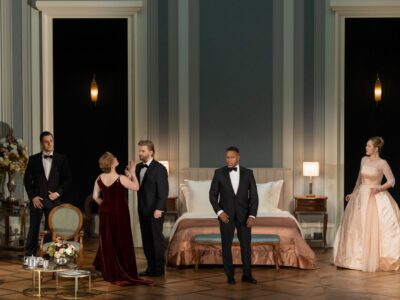
The composer and librettist did make a run for historical truth in their opera Robert Devereux. The overture begins with much drama and even “God Save the Queen”, wrongly considered by many to be the “English national anthem”, passes anachronistically. Nevertheless, the overture is an excellent piece of work, there is much to be said for it being one of Donizetti’s best overtures: we are immediately confronted with a sense of impending doom. As if Trump has won the swing states. No, you feel it right away: this Robert Devereux is definitely not going to be “The hills are alive with the sound of music” (♫I am 69, going on 70♫). Fast forward: in the final scene, the queen is confronted with her horror at what has happened. She announces her resignation in favour of King James of Scotland: completely fabricated by Donizetti & Co.
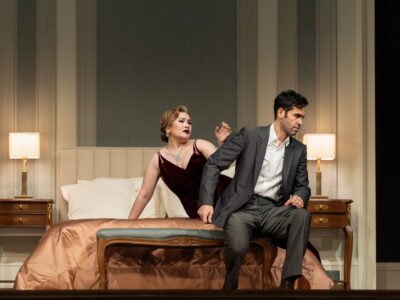
Which brings me to the subheadings Roberto Devereux was given by the Dutch National Opera in the audience information: one time “The loneliness of an old queen”, another time “The downfall of a queen”. Quite apart from the fact that these guiding additions are completely unnecessary, while “downfall” is defensible, there is no concrete reason for “loneliness” in the libretto. It may well be that Her Majesty was lonely, and however logical that assumption is: the opera is not about loneliness. (Incidentally, contemporaries claimed that Elisabetta reveled in her grief.) We do understand that some guidance from the audience (Dutch National Opera’s specialty) is needed to keep it on the right, or at least desired, track. One takes note of an opera titled Roberto Devereux“, and before you know it, the “minions” think it is about Roberto Devereux. This, of course, is not desirable. Just as many gullible people still think Macbeth is about Macbeth, but, of course, it is essentially about a protest against deforestation.
So Jetske Mijnssen has succumbed to the pressure to now throw in a “contemporary approach”; three integrity-directed Tudor productions (Anna Bolena, Maria Stuarda and this Roberto Devereux, all directed by Mijnssen), that doesn’t improve your chances of ever being asked again by the Opera House on the Amsterdam Amstel. So Mijnssen has brought “her Devereux” to the Adaptation Barn and, to substantiate her “vision”, she lapses into the ever completely incomprehensible director’s newspeak of the vaguely talkative blatherskites with histrionic glasses.
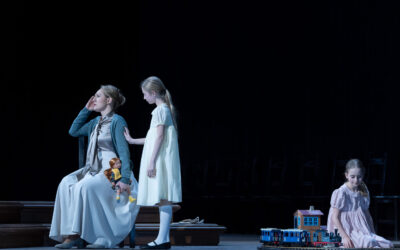
Is Roberto Devereux really a “contemporary drama”? It is only 80-90 years ago that the lover of Dutch Queen Wilhelmina was beheaded, but that does not make Roberto Devereux a “contemporary drama”. In subversive circles, who with boundless courage escaped from the Kremlin on the Amstel and swam across the Amstel at the risk of their lives, Roberto Devereux is called a “historical drama”. Because it happened a few thousand years ago. (Please keep that between us.) On the other hand, if these stage pictures are “contemporary”, then The Tower is a creation of Le Corbusier. In fact, it all looked very 19th century on stage.
Donizetti
Oh yes, Donizetti! That’s right, he took part, or at least would have liked to. Roberto Devereux comes from a late period in Donizetti’s career, when he was moving away from the musical formulas of bel canto, such as the use of the two-part aria: the first part, a slow cavatina, followed by a fast cabaletta to reflect a sharp turn of emotion. With the “late Donizetti”, inspiration came more from the text, allowing him to free himself from these constraining bel canto formulas. For Elisabetta’s character, this approach resulted in fabulous singing that came directly from the emotions related to the text, and director Mijnssen is right about that.
Take, for example, the cabaletta from the third act: “Quel sangue versato al cielo s’innalza” (“The blood that is spilled rises to the sky”), the last scene of Elisabetta. It is the Sisyphean rock of the belcanto soprano. The Queen is driven to extremes when she learns that Devereux is lost to her forever, and her mental state is expressed in extreme vocal challenges. Large intervals suggest that a person, this person, has reached a breaking point. The sudden change of mood through changes in tempo and dynamics also points to Elisabetta’s unhinged state of mind. In the repetition (“Quel palco…”) of the main theme of “Quel sangue versato”, Donizetti therefore uses a modified text to emphasise the drama.
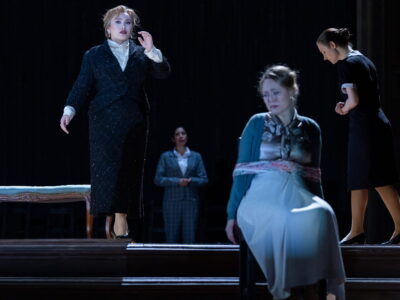
Let’s focus on the talented plodders on stage. First, that soprano role which is at the limits of technical possibilities and is unquestionably leading in terms of difficulty. The role requires an enormous investment of vocal energy. Much more is needed here than the stereotype of the beautifully chirping bel canto nightingale. American soprano Beverly Sills once said that Elisabetta had cost her five years of her career. Elisabetta is sung in the DNO production by Barno Ismatullaeva, who performs her role with admirable confidence: she moves between registers quite easily, has impeccable breathing technique, fine diction and soft, rounded high notes, given what the score calls for. We spoke to the ravishing diva shortly after the performance. “It is absolutely the most difficult role of all difficult roles,” Barno Ismatullaeva said. “Extreme demands on the diaphragm and spirited challenges in terms of breathing and register, and that’s just the basics. I have sung Norma and thought that was difficult, now I know better. By the way, it’s my first Donizetti role, so I’m going all-in right away!”
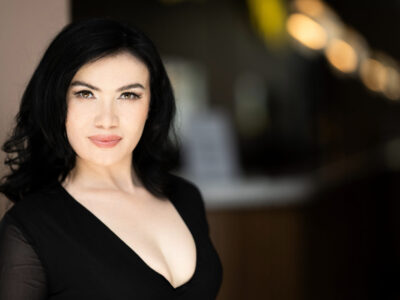
Ismael Jordi
There are few tenors today who are able to bring these scores to life thanks to their exhaustive knowledge of the mechanisms of the bel canto style. And in our memory, Ismael Jordi once came pretty close. This time we were disappointed, What immediately struck us: little stage presence, the association “just standing there” welled up in our mindset. And vocally? Alas, that too was disappointing. We heard a rather powerless sound that was also unbalanced in terms of intonation and dynamics.
Nikolai Zemlianskikh
Nikolai Zemlianskikh, with his not too large, but beautiful, beautifully clear and above all warm voice, seemed to us more like a low tenor than a true baritone. It was a great pleasure to hear him at work.
Angela Brower
Angela Brower, whom we remember in Amsterdam as Dorabella in Così fan tutte, is a very versatile singer with a well-nigh untouchable Mozart reputation. She excelled in her role of Sara and sang with verve, effectively and extraordinarily musically.
Enrique Mazzola
Conductor Enrique Mazzola, who (also) likes to call the three Queen operas the “Tudor Trilogy” although Donizetti never considered them a “trilogy,” conducted the Netherlands Chamber Orchestra with enthusiasm and “clearly visible physical commitment.” But if the enthusiastic gesticulation results in a colorful and dynamic musical stream of unadulterated Donizetti, what’s the problem? Isn’t there. Gibst es nicht! Non esiste! Mazzola knows his Donizetti through and through and is emphatic about how the nineteenth-century maestro bent the rules of traditional bel canto to his will.
That the chorus of The Dutch National gave another top-notch performance is gradually becoming an unnecessary announcement
The audience thanked the cast with a standing ovation. That’s Dutch folklore. If you turn on stage once around your axis, you also get a standing ovation.

Wonderful review, Olivier. Compact, consistent, respectful. Although I don’t like the term ‘Kremlin on the Amstel’. From 2002 until 2018 I saw almost all DNO operas and I loved most of them. From 2018 onward I had to stop visiting DNO. Why? I simply could not pay the prices. As a good Brecht/Weill singer I missed ‘Aufstieg und Fall der Stadt Mahagonny’, which is ridiculous, DNO! I managed to see ‘Königskinder’ with my Eritrean son Mussie. ‘Dad, do you realize I’m the only black man here?’ I managed to see ‘Blue’, I thought it was excellent as a… Read more »
Wonderful review, Olivier. Compact, consistent, respectful. Although I don’t like the term ‘Kremlin on the Amstel’. From 2002 until 2018 I saw almost all DNO operas and I loved most of them. From 2018 onward I had to stop visiting DNO. Why? I simply could not pay the prices. As a good Brecht/Weill singer I missed ‘Aufstieg und Fall der Stadt Mahagonny’, which is ridiculous, DNO! I managed to see ‘Königskinder’ with my Eritrean son Mussie. ‘Dad, do you realize I’m the only black man here?’ I managed to see ‘Blue’, I thought it was excellent as a black opera.… Read more »
Dat van die opera’s in bars weet ik niet zo…. BLUE was mijns inziens een stuk muzikale onbenulligheid, met een draak van een verhaal De laatse acte had wel iets van DER EVANGELIMANN ban Kienzl, alleen is de muziek van Kienzl 100 x beter.
Zie HIER
We blijven verschillen van mening. Is dat erg? Wat mij betreft niet, we kunnen elkaar voeden, jij met je encyclopedische kennis van opera, ik met mijn soms onorthodoxe visie op wat opera moet zijn. Over opera’s in bars heb ik het helemaal niet. Het gaat me om nieuwe (en oude) ‘hits’. Het Slavenkoor wordt door iedereen nog steeds meegezongen. Hetzelfde geldt voor het inmiddels versleten O mio babbino caro, waaraan veel jong spul zich vergrijpt. Zo hadden we onze negenjarige hoe heet ze ook alweer. Ik heb haar onlangs op Youtube gezien en gehoord tijdens een recital in Zuid Afrika,… Read more »